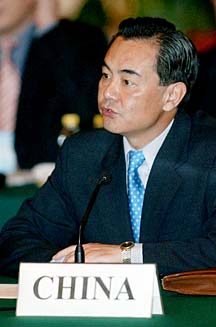
[ OUR OPINION ]
Beijing talks offer hope
for ending nuclear standoffTHREE days of talks including the United States, North Korea and four other nations produced no agreement, but they were successful in providing hope for resolving the Korean nuclear crisis.
THE ISSUE
The United States, North Korea and four other nations completed three days of negotiations about resolving the Korean nuclear crisis.
The officials agreed to meet again within two months, giving time for Kim Jong-il, the North Korean leader, to grasp the degree of isolation he faces by continuation of his bellicose posture. The talks should lead eventually to a security guarantee to Pyongyang in return for an irreversible end to its nuclear activity.
ASSOCIATED PRESS
Wang Yi, Chinese vice foreign minister, is optimistic about the North Korea nuclear talks.
The very occurrence of the Beijing talks was a success. North Korea had demanded bilateral talks with the United States, and the Bush administration had insisted on multilateral talks. Before departing, according to a U.S. official, Russia, South Korea, Japan and, most important, China had joined the United States in telling North Korea that it has no rational choice but to stop being confrontational and to abandon its nuclear program. The official North Korean news agency said it felt "betrayed."
North Korea's chief delegate affirmed near the end of the talks that his country had developed nuclear weapons and vowed to prove it by carrying out a nuclear test. Officials interpreted the remarks as meaning North Korea might conduct such a test underground as well as missile tests to show it could deliver a nuclear device to a target.
The North has deployed missiles with a range of little more than 600 miles. In 1998, it sent a three-stage rocket over Japan, and the third stage failed. The next generation of missiles capable of reaching Hawaii, Alaska and perhaps the U.S. West Coast is believed to be still under development.
North Korea's threat is greater for the South and for Japan than for the United States. However, a Japanese diplomat said he heard no statement from the North Korean official during the talks "that made us all frightened so that we felt we should run home and hide under our beds." Indeed, the North Koreans agreed to proponents of continued negotiations that it would take no action in the meantime that would "escalate the situation."
China's role in these and future talks is paramount. China is a major supplier of energy and food to North Korea, which was left with the clear impression that China would not take its side against the United States. Still, the talks produced no movement from the U.S. demand for permanent and verified elimination of the North's nuclear program or from Pyongyang's demand for a guarantee that the United States won't launch a pre-emptive strike.
"I believe these issues can be resolved," said Wang Yi, China's vice foreign minister and host of the talks. "What is important is to maintain this momentum of dialogue that has not come easily."

